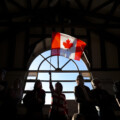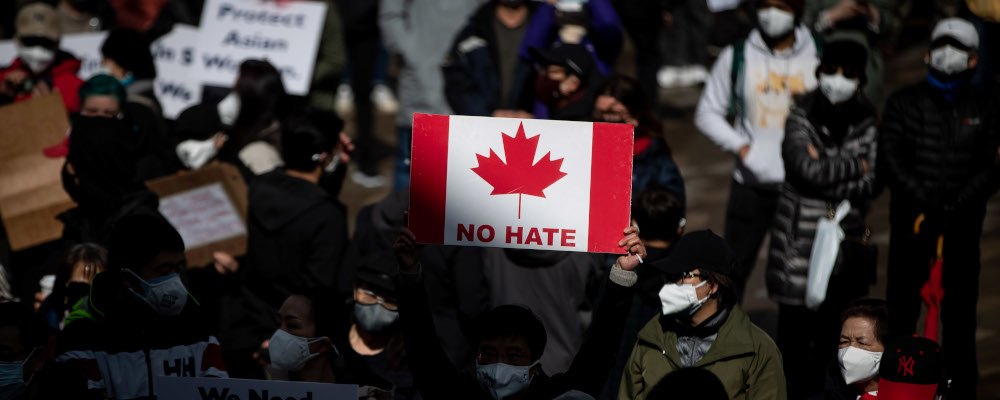My Toronto neighbours recently put up a sign with various religious symbols, national flags, and a Black Lives Matter fist with the slogan “Hate does not live here.”
I didn’t think much of it, after all, I live in a neighbourhood where the house up the street demands “Justice for George Floyd” and another declares “I support my neighbours in tents” referring to the homeless squatters in the local park (unless those neighbours get too close). Nothing unusual here, especially since I live in a riding that votes Green and NDP. Those who think differently tend to keep their thoughts to themselves.
These messages are a bit of political theatre and virtue signalling that say, “I eat my vegetables, do you?”
But it got me thinking about how much hate there actually is in Canada. Many feel that hate has swept the country with a rise in homophobia, Islamophobia, Asia bashing, and attacks on racial minorities. This perception has been magnified by the recent tragic deaths of four Muslim family members in London, Ontario.
Hate is a pretty strong emotion and most of us haven’t the time to carry too much of it as we go about tending the chores of daily life. As humans, we tend to hate the usual things such as the hurt and resentment of broken relationships, impossible bosses, or lining up at airport security. But I do hold a special hatred for those who abuse children or animals.
In the Second World War, the draft board asked Oscar Levant, the American actor and wit, if he could kill. He answered, “I don’t know about strangers, but friends, yes.”
But how much hate is really out there?
The usual perception is that hate crimes are committed by gangs such as the KKK and neo-Nazis, going about attacking and tormenting visible and racial minorities. The reality is a different story.
Over the past twenty years, Statistics Canada has kept a running tally of police-reported hate crimes classified by race, ethnicity, colour, culture, sexual orientation, gender identity and mental disability. For 2019, the average number of reported crimes that were motivated by hate was 1,946. These are reported crimes, both physical and non-physical attacks, but not convictions.
Antisemitism still remains the world’s leading universal hatred.
Of all the reported crimes in Canada that are not traffic related, hate crimes make up 0.1 percent of all criminal complaints. Only two percent of hate-related crimes are directed at the Indigenous population. Even though the anxiety of hate attacks has risen among Asians, the Jewish community was at the top of the victim’s list at 18 percent of reported hate crimes even though Jews represent only 1 percent of Canada’s population.
Antisemitism still remains the world’s leading universal hatred.
What also falls out from the data is that most of these hate crimes are committed by young males under the age of 20, and many as first-time offenders. The same trends are found in the U.S. and Sweden. We seem to have a crime wave of juvenile offenders, which indicates an entirely different criminal problem than how these types of crimes are typically thought of.
We can’t look into people’s hearts, but these metrics certainly don’t suggest a country engulfed in a wave of uncontrolled hate-filled criminality. For ageless hatred, you’ve only to look at the racial and cultural strife around the world where hatreds are passed down like inheritances from one generation to the next. Mercifully, Canada has been spared that national tragedy.
On the broader question of hate, the perception is that the extreme right dominates it. What gets less attention is that the radical left has its own brand of hatred that manifests itself with attacks on anyone who does not support the banner of political progressivism. In the U.K., for example, British Home Secretary Priti Patel, a daughter of Indian immigrants, earned the opprobrium and hatred of the intelligentsia for daring to take a different position on immigration.
In the U.S., hatred of the police has led to the killing of officers fueled by movements against law enforcement. Gay and lesbian police officers are not only banned from walking in Pride marches throughout North America but a number have been hounded and shamed into leaving their professions and accused of being traitors to the cause.
It has been said that the political left believed all humans were born good and made bad by society and that conservatives held that all people were born in sin, and it took the strictures of society to save our souls. That trope has now been put on its head. Progressives now believe some of us are highly suspect in our intentions and behaviour from birth.
Only a fool would claim that hate does not exist in Canada, but the tragedy in London, Ontario, shouldn’t be remembered by the act of one hate-obsessed individual, but by the millions of Canadians who fell to their knees in grief at the news and showed universal support for the family.
I’m glad hate doesn’t live in my neighbour’s house, but it doesn’t live in Canada either.
Recommended for You

Need to Know: Legacy media has a diversity problem

‘A celebration of the spirit of Alberta’: Ryan Hastman on the political, economic, and cultural importance of the Calgary Stampede

‘Can we actually be an independent country?’: Michael Ignatieff on the 60th anniversary of Lament for a Nation

Fred DeLorey: Why the NDP may be in even bigger trouble than we think




